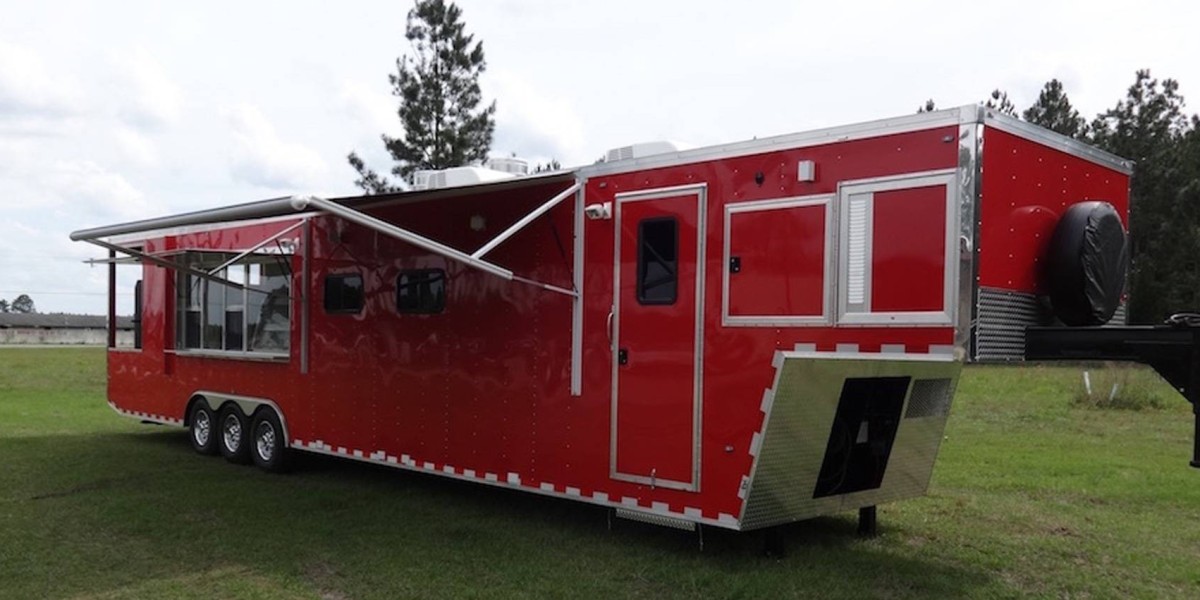In today’s fast-paced world, businesses are looking for ways to reach customers quickly and efficiently. One trend that has taken off in recent years is the use of concession trailers. These portable, customizable trailers have revolutionized industries like food, beverages, and retail, offering a low-cost, flexible solution for entrepreneurs looking to start or expand their business.
Whether it's at a bustling festival, a county fair, or even a parking lot outside a stadium, a concession trailer is the go-to option for business owners who want to tap into high-traffic areas without the need for a traditional brick-and-mortar store. If you’re considering venturing into a mobile business, understanding what a concession trailer is and why it's a great investment could be the key to your success.
What is a Concession Trailer?
A concession trailer is essentially a fully equipped mobile unit that can be customized to serve food, beverages, or retail products. Unlike food trucks, which are self-propelled, a concession trailer must be towed by another vehicle. This gives business owners the flexibility to drop the trailer at one location while still using their primary vehicle for other tasks. It’s an ideal setup for businesses that want to operate in one place for an extended period, like at a fair or a long-term event.
These trailers come in various sizes, from small units perfect for a single operator to larger ones capable of hosting a full team. Whether you’re selling gourmet cupcakes or handmade crafts, a concession trailer can be tailored to your specific needs, complete with cooking equipment, refrigeration, or shelving for retail items.
Why Concession Trailers Are Gaining Popularity
- Low Startup Costs: One of the main reasons entrepreneurs are drawn to concession trailers is the low startup cost compared to traditional businesses. Opening a restaurant or retail store often involves high upfront expenses like rent, utilities, and staff salaries. A concession trailer allows you to bypass many of these costs. Plus, if you buy a trailer, you own your workspace, which can be moved and reused as needed.
- Flexibility and Mobility: The mobility offered by a concession trailer is unmatched. You have the ability to bring your business directly to your customers, whether they’re at a concert, a farmers’ market, or a sports event. This eliminates the need for customers to seek you out, as you can strategically place yourself where large crowds are gathered. The freedom to travel and choose locations makes the concession trailer a flexible solution for seasonal or event-based businesses.
- Customization: Another appealing feature of the concession trailer is its ability to be fully customized. Business owners can work with manufacturers to create a layout that best suits their specific operations. For example, a food concession trailer can be equipped with ovens, grills, sinks, and refrigerators, while a retail trailer may feature racks, shelving, and a point-of-sale system. This versatility allows you to create a mobile business that feels just as efficient and professional as a fixed location.
- Easier Licensing: In many cases, obtaining a license for a concession trailer is easier and less expensive than securing permits for a full-scale restaurant or retail store. While each state and city may have its own requirements, mobile businesses are often seen as lower risk, especially if they don’t serve alcohol or require extensive renovations to operate.
Choosing the Right Concession Trailer for Your Business
Before jumping into the world of mobile business, it’s essential to choose the right concession trailer for your specific needs. Consider the following factors:
- Size and Space Requirements: How much space do you need for your business? A larger concession trailer might be necessary if you require multiple cooking appliances or retail displays. However, if you're just selling pre-packaged items or simple beverages, a smaller trailer might suffice.
- Customization: Make sure your concession trailer is tailored to your business. Think about the types of equipment, storage, and layout you need for an efficient operation. This will not only make your work easier but also improve customer experience.
- Towing Capabilities: Since a concession trailer requires a separate vehicle to move, ensure your existing vehicle has the towing capacity for the trailer you choose. Larger trailers will need more powerful vehicles, while smaller ones can be towed by a standard truck or SUV.
Marketing Your Concession Trailer
While having a concession trailer gives you the ability to move to high-traffic areas, you still need to invest in marketing to attract customers. Social media is a powerful tool for mobile businesses. By posting your location, sharing photos of your setup, and offering promotions, you can draw more people to your trailer.
Many concession trailer owners also partner with event organizers or local markets to ensure steady foot traffic. Additionally, eye-catching branding on the trailer itself is crucial—your trailer is your storefront, and it should stand out in a crowd.
Conclusion
The growing popularity of concession trailers shows that mobility and flexibility are crucial for modern businesses. Whether you're a chef looking to serve food on-the-go or an artisan wanting to sell handmade products at events, a concession trailer can be the perfect solution. With low startup costs, customizable features, and the ability to bring your business to the customer, it's no wonder more and more entrepreneurs are turning to this innovative option. Investing in a concession trailer could be the key to taking your business to new heights.








